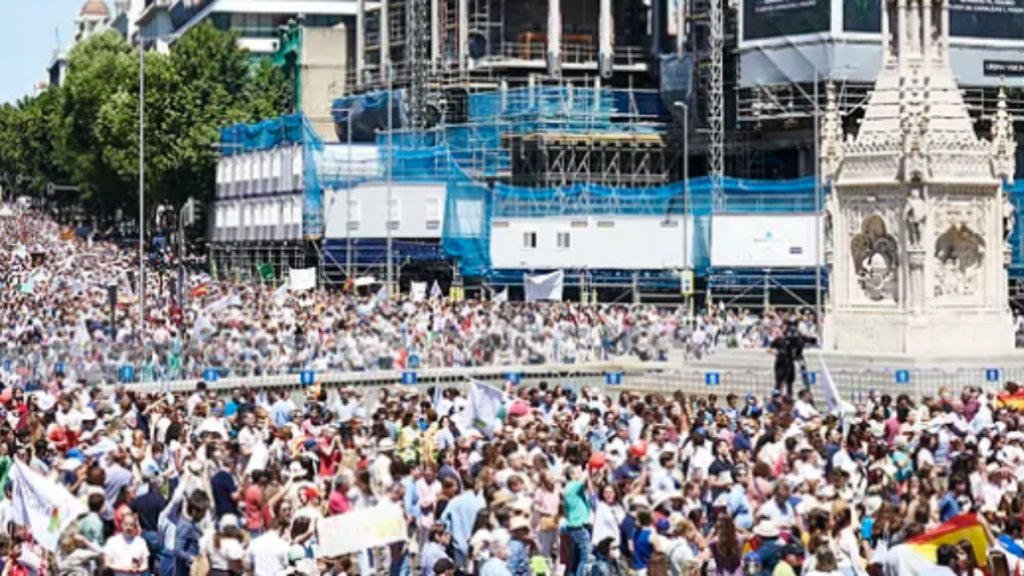Thousands of people marched through the streets of the Spanish capital of Madrid on June 26, just two days after the US Supreme Court overturned the infamous Roe v. Wade, which for fifty years maintained the unfounded claim that abortion was a constitutional right.
According to government sources, the peaceful demonstration gathered 20,000 people, but the organizers counted 100,000 people in attendance, with more than 200 pro-life and anti-abortionist associations, who walked without any incident the stretch from the Bilbao traffic circle to Plaza de Colón, with music, flags and banners flashing slogans “in defense of life” and “against abortion and euthanasia laws.”
In Spain, abortion was decriminalized in 1985. Current regulations allow it in any case (elective abortion) up to the ninth week of the child’s life in the womb, and up to the 22nd in cases of serious risk to the woman’s health, abnormalities of the unborn child, and pregnancy resulting from rape, according to the Organic Law 9/1985 and the subsequent Organic Law on Sexual and Reproductive Health and the Voluntary Termination of Pregnancy, passed in 2010, during the time of the socialist executive of José Luis Rodríguez Zapatero.
At the end of May, the reform just passed by the social-communist government led by Pedro Sánchez introduced the possibility for underage girls, from the age of 16, to have abortions without parental consent. It also eliminates the stipulated three-day waiting period before the woman decides whether or not to proceed with the termination of the child and the requirement that she be provided with information about the abortion. Other relevant points of the reform include the free distribution of the so-called ‘morning-after’ pills by the health care system and mandatory sex education in schools starting in early childhood.
Also in February, the Spanish Chamber of Deputies approved “[…] a bill with 204 votes in favor (Socialists, Podemos, Ciudadanos, Catalan Republicans and Basque Independents) and 144 against (Populars and VOX). The bill now moves to the Senate, where final approval is almost certain. Under this bill, anyone who should show up in front of abortion clinics to distribute leaflets or even simply to pray, will be liable to prison for a period of three months to one year.”
But the Madrid demonstration showed that not everyone agrees with theses laws, as we can see in the testimonies collected by El Mundo daily. There were indeed the voices of female citizens, young and old, confirming at the march that women’s bodies indeed belong to women, but the body of the child they carry is that of the child, an accomplished person, and not their own. And that society must raise the voice on behalf of the voiceless, the unborn, the most vulnerable of all.
Politics was also present in Madrid that Sunday in June. The former interior minister and president of pro-life organization One of Us, Jaime Mayor Oreja, optimistically told reporters that what the march shows is that “the culture of life is more alive than ever,” that the US Supreme Court ruling “is an element of hope and the future,” and that “with laws that destroy human nature, no tomorrow is built.”
Also with him was María San Gil, former president of the Basque Populars party and current vice-president of Fundación Villacisneros, who firmly stated, “…enough of ideological laws that impose an authoritarian project on society,” calling the US ruling “a path of hope.”
Some members of the VOX party, including the president, Santiago Abascal, and the spokesman in Congress, Iván Espinosa de los Monteros, also attended the rally. The latter said in front of reporters that he wanted to defend “the right to life as an alternative to the 100,000 abortions on which the state spends a lot of money each year, while pouring very little into pro-life policies.”
